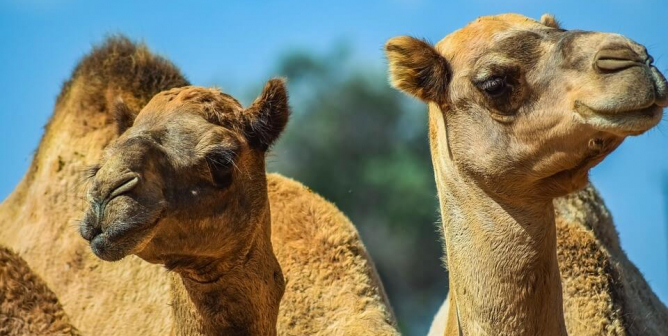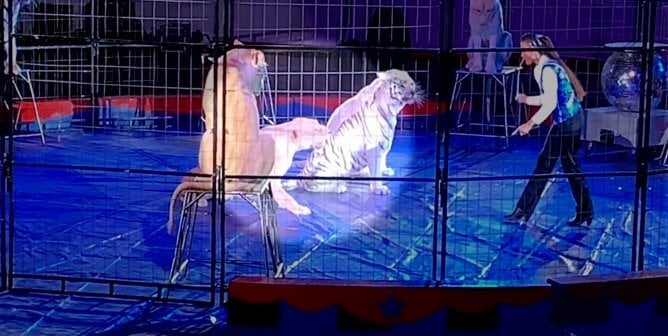Here’s Why the Barry R. Kirshner Wildlife Foundation Is the ‘Worst Roadside Zoo in America’
The big cats, bears, and other animals at the Barry R. Kirshner Wildlife Foundation (Kirshner)—a roadside zoo in Oroville, California—live in tiny, dismal chain-link cages without access to grass, trees, pools, or any other meaningful environmental enrichment.
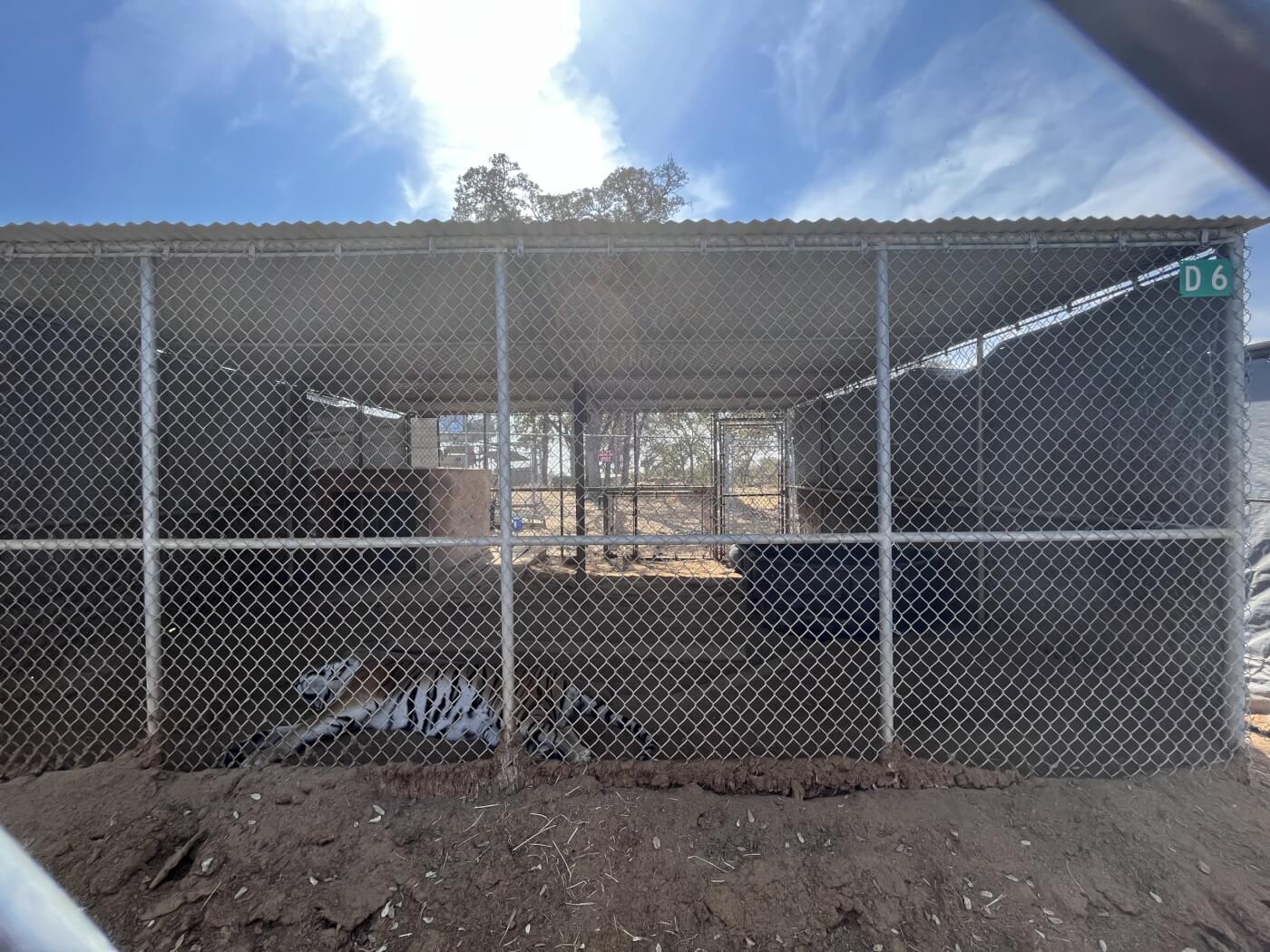
Kirshner has a long, troubling history of violating the federal Animal Welfare Act (AWA). The U.S. Department of Agriculture (USDA)—which is responsible for enforcing the AWA—has repeatedly cited this notorious facility for failing to provide for even the most basic needs of the animals it confines. The California Division of Occupational Safety and Health (Cal/OSHA)—a state agency responsible for ensuring workplace safety—has also cited the roadside zoo for failing to keep its workers safe.
Kirshner has proved that it can’t be trusted to care for animals.
The endangered big cats and other animals confined there develop preventable diseases and wounds that are left to fester.
PETA fired off a letter calling on the California Department of Fish and Wildlife to revoke the permit that allows Kirshner to keep and exhibit animals and to refer it for criminal prosecution under the state’s cruelty-to-animals laws.
Check out the timeline of citations from state and federal agencies below to discover why PETA dubbed Kirshner the “Worst Roadside Zoo in America.”
2015: A Rare USDA Fine for Kirshner
In November 2015, the USDA hit Kirshner with a $5,464 penalty for six alleged violations of the AWA that took place between November 2011 and August 2014, including one for failing to provide a tiger and a lynx with veterinary care and four for allowing members of the public to directly (and dangerously) interact with lions, tigers, and a bear.
The USDA only issues such penalties for egregious animal welfare violations, securing Kirshner’s place among the worst of the worst roadside zoos.
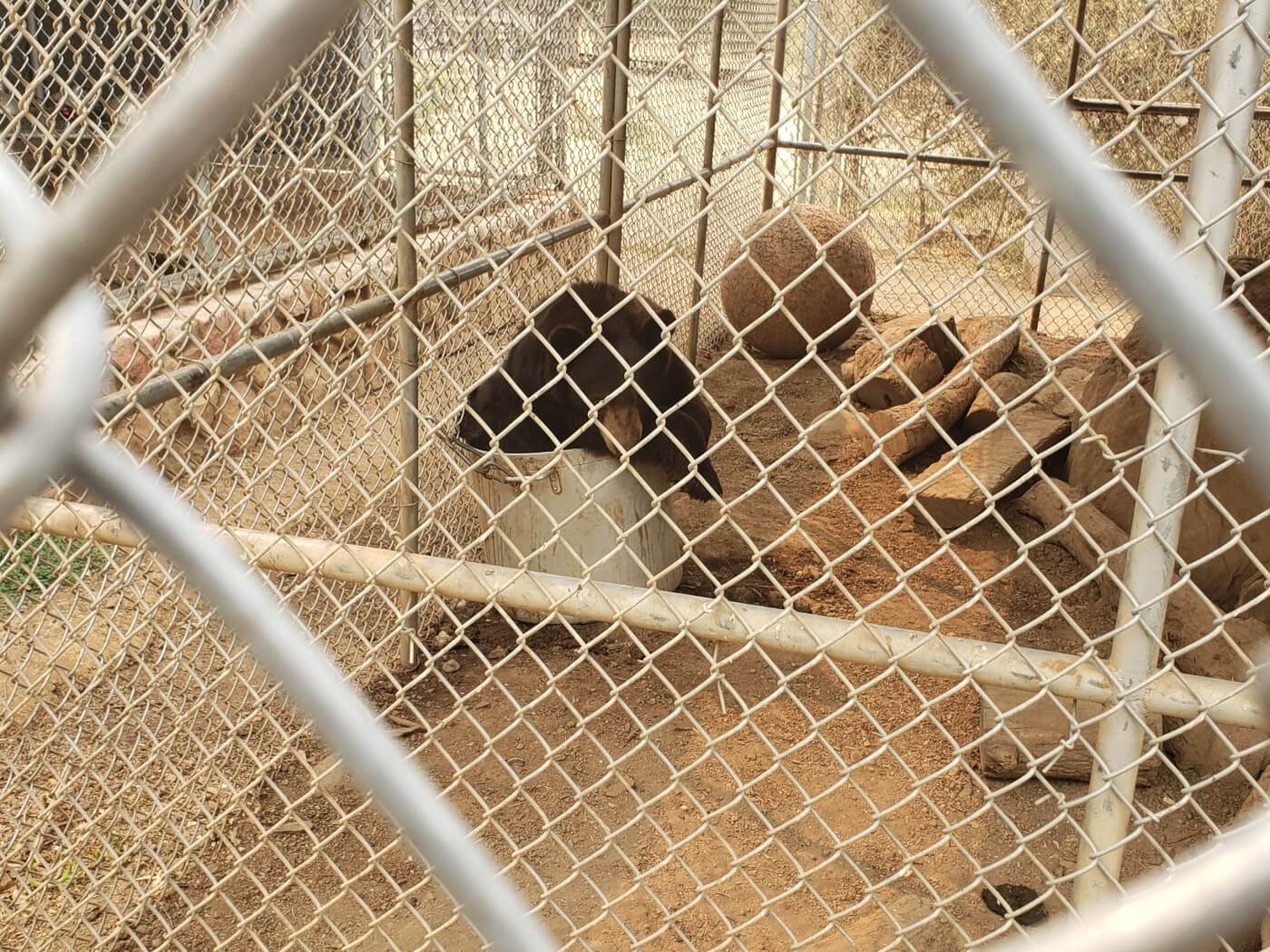
2016–2019: 10 More Citations for Violating the AWA
Despite the 2015 USDA penalty, Kirshner continued to rack up citations for failing to care properly for the animals it caged. From 2016 through 2019, the USDA cited the roadside zoo 10 times for violating the AWA.
These lowlights illustrate the egregious suffering that animals endured at Kirshner.
- July 20, 2016: The USDA cited the facility for failing to handle a 16-week-old lion cub named Atlas properly and safely after staff allowed a member of the public to hold him without using a harness or a leash. The inspector noted that he “appeared to be struggling and pushing away from the individual holding him.”
- April 26, 2017: The feds cited the operation for failing to provide a lynx who had a history of seizures with adequate veterinary care. After enduring back-to-back seizures, he was found dead in his enclosure. The USDA inspector noted, “The only treatment regimen ever attempted was phenobarbital alone, which was not sufficient to adequately control the seizures in this animal.”
- April 26, June 7, and June 26, 2017: The USDA cited Kirshner on each of these days over its failure to provide a lion cub named Lucie with adequate veterinary care and an appropriate diet. According to inspection reports, she became “severely lame, uncomfortable, and unwilling to stand,” and at the request of USDA officials, radiologists reviewed imaging of her bones and determined that they showed signs “typically seen in metabolic bone disease, which can be caused by a dietary deficiency.”
- August 15, 2019: Kirshner was cited for failing to provide animals with cooling measures in triple-digit temperatures. The USDA inspector noted that several animals “were panting and appeared uncomfortable and hot.” Inside a den box where a clouded leopard was observed panting, a thermometer showed the surface temperature to be about 106 degrees. Under the deck in the ringtail enclosure, it was around 110 degrees.
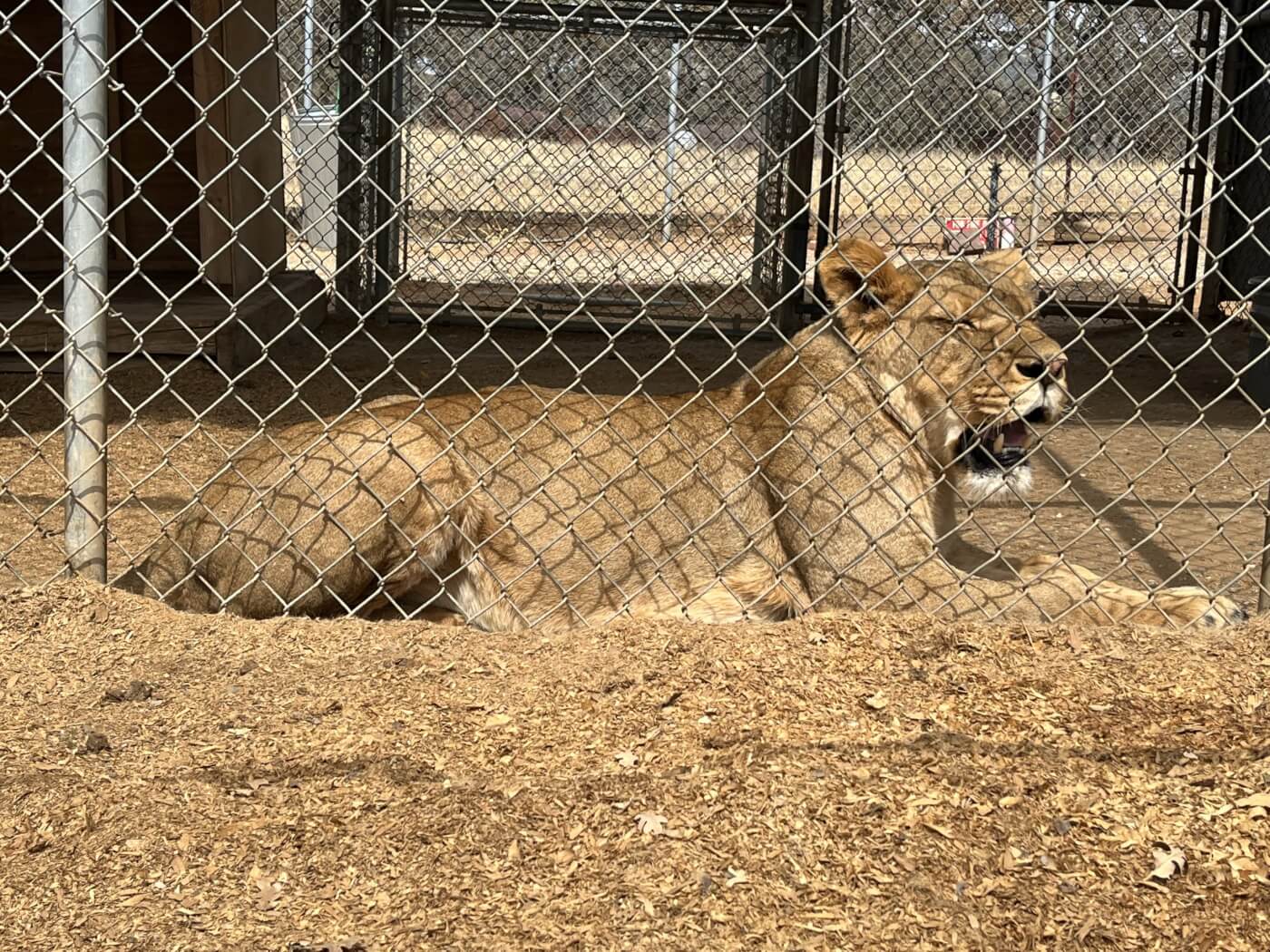
2021–2024: Kirshner Receives More Than Two Dozen AWA Citations Plus Multiple Penalties From Cal/OSHA
Since the beginning of 2021, the USDA has issued Kirshner 28 citations, including 13 in 2024 alone. In 12 consecutive USDA inspection reports, officials detailed many of the same problems, indicating that this seedy facility was apparently incapable of fixing its issues or unwilling to do so.
The serious issues documented at America’s worst roadside zoo caused animals to suffer and jeopardized their welfare. They included inadequate veterinary care, improper handling of animals—including during dangerous hands-on photo ops with guests—inadequate cooling measures during hot weather, and damaged and inadequate enclosures that could injure animals or allow them to escape.
- January 7, 2021: The USDA cited Kirshner for failing to have a valid written program of veterinary care.
- June 22, 2021: The USDA cited Kirshner over an incident in February 2021 in which a volunteer was injured by a leopard named Royal while she was inside an enclosure with the big cat. Cal/OSHA later fined the facility $1,800 for allowing this incident to occur. The Cal/OSHA summary explained that the leopard had jumped on the volunteer after she fell down and started biting her around the neck, inflicting puncture wounds that required hospitalization. The leopard escaped from the primary enclosure and was deemed “a threat to the community until [the animal] was back inside [the] primary containment,” according to a California Department of Forestry and Fire Protection report.
- August 11, 2021: USDA officials cited Kirshner—again—for failing to provide animals with cooling measures, this time on a day forecasted to reach 106 degrees. The inspector noted several animals who appeared uncomfortable, particularly those who were overweight, including a tiger, a tiger/lion hybrid, a leopard, a lynx, and a clouded leopard. The inspector also observed that numerous cats were displaying visible signs of labored respiration, such as open-mouth breathing, owing to the heat.
- August 11, 2021: Kirshner was cited for failing to provide a deer who had overgrown hooves with adequate veterinary care, which could cause discomfort and lead to injuries or lameness.
- November 1, 2021: Kirshner was cited for failing to notify its veterinarian about a coatimundi’s progressing hair loss and wounded leg. It also failed to notify the vet about a wolf who was incessantly pacing around an enclosure, to the point of wearing a deep track into the ground.
- January 4, 2022: Kirshner failed to handle a snow leopard in a way that minimized the risk of harm to the animal, earning the worst roadside zoo in America yet another citation. This came after a Kirshner volunteer took the snow leopard to a juvenile detention facility, where two people were photographed holding the cat.
- April 22, 2022: Stemming from a PETA complaint, Cal/OSHA again cited and fined Kirshner based on several social media posts showing staff dangerously handling a leopard who was too large and too mature to be handled safely by members of the public.
- June 15, 2022: Kirshner was cited for failing to consider the psychological well-being of a ring-tailed lemur who was being housed alone after the death of another lemur.
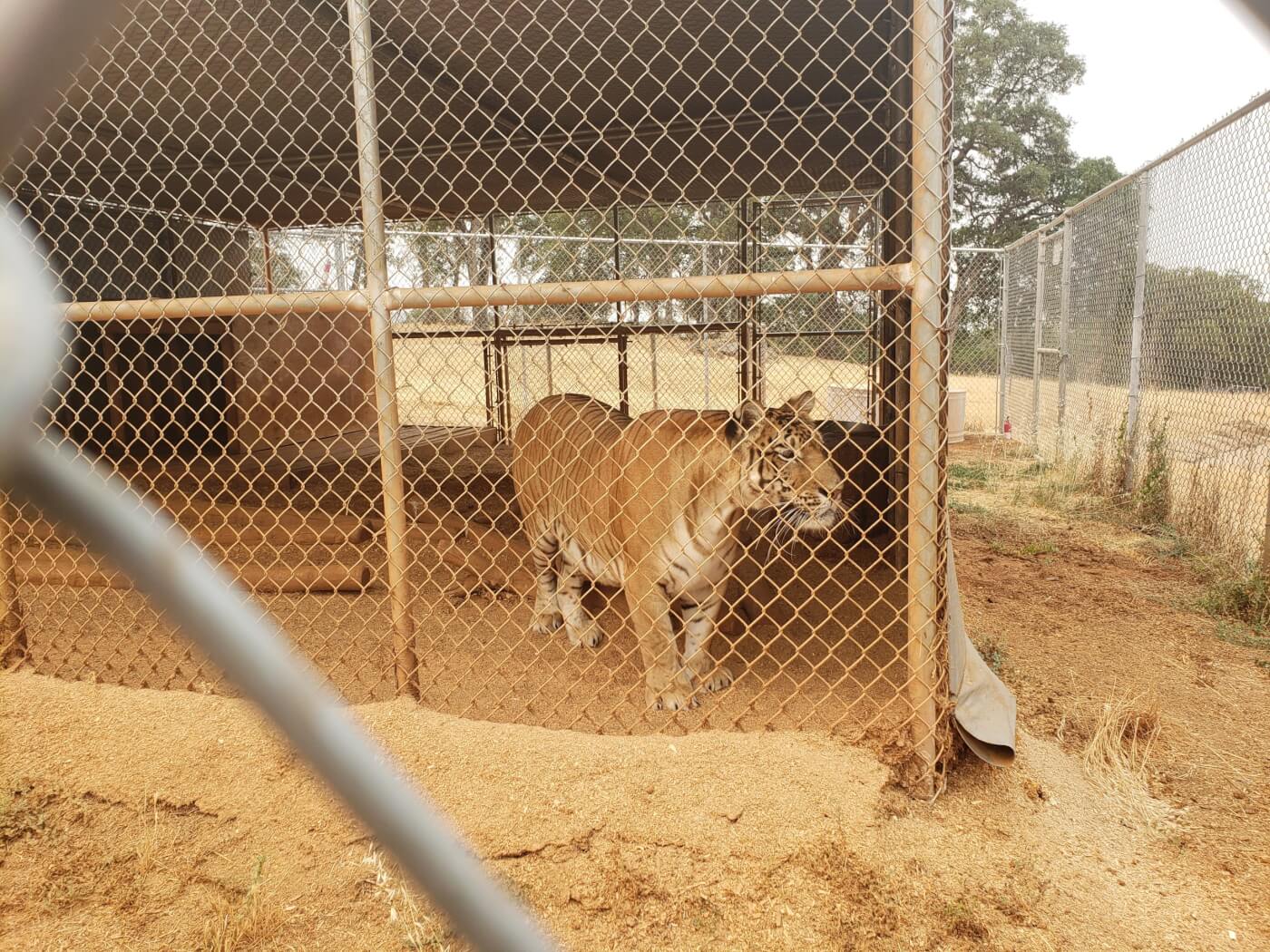
According to public records, a tiger confined by Kirshner gave birth to two cubs in June 2023.
One of the cubs died two days later. PETA advised the California Department of Fish and Wildlife in July 2023 that the facility was violating its permit conditions by breeding tigers, but state authorities apparently never followed up with an investigation and instead renewed the sleazy roadside zoo’s permit in November 2023. In 2024, the surviving tiger cub, named Shyra, was found at Kirshner suffering from broken bones and muscle loss due to malnutrition. She was later confiscated by the California Department of Fish and Wildlife and eventually transferred to the Performing Animal Welfare Society in San Andreas, California.
Records from the USDA reveal that in addition to Shyra, other animals at Kirshner were found to be suffering from inadequate care in 2024—including a mule deer whose hooves were so overgrown that it affected his stance and two big cats with open wounds that had not been reported to the roadside zoo’s attending veterinarian.
What You Can Do for the Big Cats, Bears, and Other Animals at America’s Worst Roadside Zoo
Never buy a ticket to Kirshner or any other roadside zoo where animals languish in miserable conditions. Please let your friends, family members, and social media followers know why they should do the same.


